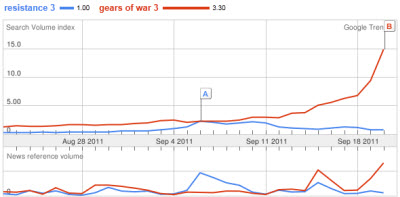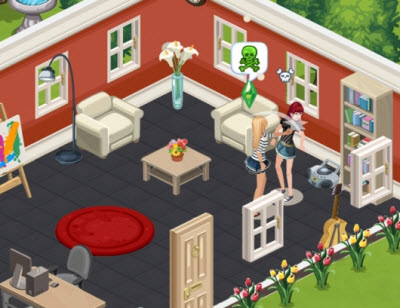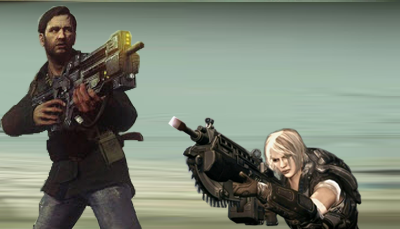 EDITOR’S NOTE: Welcome to VentureBeat’s new newsletters. Each week, I’m writing a column on an aspect of gaming world that GamesBeat covers. My colleague Dylan Tweney is writing a column on technology and business called Dylan’s Desk. Together, these columns will be available to newsletter subscribers a whole day before they appear here on the website.
EDITOR’S NOTE: Welcome to VentureBeat’s new newsletters. Each week, I’m writing a column on an aspect of gaming world that GamesBeat covers. My colleague Dylan Tweney is writing a column on technology and business called Dylan’s Desk. Together, these columns will be available to newsletter subscribers a whole day before they appear here on the website.
The blockbuster video game season has begun, and so has the trash talk. Gamers love to set up “us versus them” grudge matches between fans of different games and game systems.
While these grudge matches are artificial, and gamers often play both games, they do tell us a lot about what we really love or hate about video games. That’s why we love to build top-ten favorite lists and shoot others down. If we play along for the sake of argument, we can learn a thing or two.
So if anything seems unusual about this year, it’s the fact that there are so many grudge matches happening.
The latest is between Resistance 3 from Sony/Insomniac Games and Gears of War 3 from Microsoft/Epic Games. These titles have traveled the same competitive rail for five years now. Resistance Fall of Man debuted in the fall of 2006 on the PlayStation 3 as did the original Gears of War for the Xbox 360. Resistance 2 came out at the same time as Gears of War 2 in the fall of 2008. And Resistance 3 debuted on Sept. 6, while Gears of War 3 came out on the 20th. That’s an epic grudge match with some real history to it, since it is very rare to have game launch schedules line up so close to each other over three generations of games.
 Both of these games began as exclusives meant to show off the capabilities of their respective consoles. Surprisingly, even though Sony’s PS 3 came out a year after the Xbox 360, Microsoft’s console held its own over the years as a platform for high-quality 3D games. While Resistance 3 games were slightly prettier, they didn’t sell better (as far as we know) and they had lower overall critic ratings, based on review aggregator Metacritic.com. Resistance scored an average of 85.6 out of 100 as a series, while Gears scored 92.6. When you look at a Google Trends report (pictured right), searches for Gears of War 3 outnumber searches for Resistance 3 in the last 30 days. Epic Games has clearly beaten Insomniac here, from a purely numbers point of view.
Both of these games began as exclusives meant to show off the capabilities of their respective consoles. Surprisingly, even though Sony’s PS 3 came out a year after the Xbox 360, Microsoft’s console held its own over the years as a platform for high-quality 3D games. While Resistance 3 games were slightly prettier, they didn’t sell better (as far as we know) and they had lower overall critic ratings, based on review aggregator Metacritic.com. Resistance scored an average of 85.6 out of 100 as a series, while Gears scored 92.6. When you look at a Google Trends report (pictured right), searches for Gears of War 3 outnumber searches for Resistance 3 in the last 30 days. Epic Games has clearly beaten Insomniac here, from a purely numbers point of view.
Grudge matches among hardcore gamers are often about graphics quality, game play, settings and story. The quality of multiplayer play, unlockable rewards and downloadable content is increasingly becoming part of the banter too. For the longest time, the grudge matches were also about the consoles: In short, whether the PlayStation 3 was better than the Xbox 360. The Gears versus Resistance debates stir up a lot of passion, in part because a lot of this is subjective.
I played both games all the way through. It turned out that the game with the best graphics wasn’t the winner. I gave a high rating of 90 to Resistance 3. But I felt like the Gears of War story trumped the Resistance story for the third time in a row. Gears was just more emotional and it had a story arc that circled back to the beginning, while Resistance 3 followed a fairly new character’s story to its conclusion. Both stories had female characters for the first time, with those females taking lead roles in the fighting in Gears. It’s no surprise then that the interaction among the Gears characters was more emotional. Gears is all about brotherhood, and it introduced sisterhood as well.
To me, when you put a good book or finish a movie or complete a game — and the story stays with you — then that is the definition of a piece of content that is just better than anything else. Gears is simply more memorable for me than Resistance, so I rated it 92 out of 100.
What companies can do about this
 For game publishers, you can stir up a lot of passion for a little bit of marketing money when you create your own grudge match. Trion Worlds stirred up a lot of passion among rival World of Warcraft gamers when it advertised its new Rift massively multiplayer online game by saying, “You’re not in Azeroth anymore,” a reference to the world in Activision Blizzard’s World of Warcraft.
For game publishers, you can stir up a lot of passion for a little bit of marketing money when you create your own grudge match. Trion Worlds stirred up a lot of passion among rival World of Warcraft gamers when it advertised its new Rift massively multiplayer online game by saying, “You’re not in Azeroth anymore,” a reference to the world in Activision Blizzard’s World of Warcraft.
When you’re the underdog in the grudge match, it pays to launch your title ahead of the other one. Sony timed its Resistance 3 game well in that respect, getting a two-week advantage when gamers only had one choice. By contrast, id Software’s Rage, which is another rival in this market, is coming out at the relatively late date of Oct. 4.
The thing about grudge matches is that they oversimplify a very complex world of competitors. These days, traditional game companies can find rivals on many different fronts. They can look for grudge matches in mobile games, social games, console games, PC online games, cloud games, and even in gamer social networks.
Activision Blizzard and Electronic Arts are about to engage in one of the biggest grudge matches in all gaming history. EA’s Battlefield 3 launches on Oct. 25, while Call of Duty Modern Warfare 3 debuts on Nov. 8. Call of Duty has been selling about 20 million units a year, making EA the big underdog in this battle. But it has positioned itself ahead of MW 3 and it says it is seeing record preorders for a Battlefield game. Michael Pachter, analyst at Wedbush Morgan, believes that Modern Warfare 3 will sell the most games this season based on its series momentum, as most of your friends are now playing this game. But he also thinks that Battlefield 3 will do better than ever. Eric Hirshberg, president of Activision Publishing, has been trying to stay out of trash talk. That makes sense, as the dominant player should not acknowledge the existence of its paltry rivals, according to the usual playbook.
Meanwhile, EA CEO John Riccitiello and spokesman Jeff Brown have been throwing out as much trash talk as they can at Call of Duty. Brown told the publication Industry Gamers, (addressing his comments to Hirshberg) “You’ve got every reason to be nervous. Last year Activision had a 90 (percent) share in the shooter category. This year, Battlefield 3 is going to take you down to 60 or 70. At that rate, you’ll be out of the category in two to three years. If you don’t believe me, go to the store and try to buy a copy of Guitar Hero or Tony Hawk.” Since Activision had to shut down the latter two game franchises, those are some real low blows.
Hirshberg has indirectly fired back, saying that Call of Duty fans want 60-frame-per-second games. That means they’re fast and responsive with nonstop action. Battlefield 3 will run at 30 frames per second on the consoles, in favor of prettier graphics and more realistic physics, rather than speed. Maybe the EA trash talk is working. So far, Battlefield 3 is trending pretty good against Modern Warfare 3 in Google Trends reports. But Activision scored some mighty public relations points with its Call of Duty XP event, which brought 8,500 hardcore gamers to Los Angeles for a big budget fan appreciation event.
This grudge match may be decided by something beyond the games. Both Activision and EA are creating their own gamer social networks, which are aimed at feeding the passions of obsessed fans. If one of these social networks turns out to be better than the other, then that may be a deciding factor for gamers looking to purchase a game.
Both sides are likely to spend $100 million each on marketing before this is over. The side with the most overwhelming firepower will win.
Getting back to reality
 One new twist this year is the grudge match between Electronic Arts and social game newcomer Zynga. Zynga has dominated Facebook gaming for the past few years, but all of sudden, EA is climbing fast on the charts with the popularity of its Sims Social game. Zynga still has 2.5 users for every one that EA has, but the numbers are getting close enough to call this a grudge match.
One new twist this year is the grudge match between Electronic Arts and social game newcomer Zynga. Zynga has dominated Facebook gaming for the past few years, but all of sudden, EA is climbing fast on the charts with the popularity of its Sims Social game. Zynga still has 2.5 users for every one that EA has, but the numbers are getting close enough to call this a grudge match.
Zynga is poised to raise a billion dollars or two in an initial public offering. The possibility of that fact prompted EA to buy PopCap Games for $750 million plus. Now EA has learned how to make social games and it is bringing its brands to bear on the Facebook market, while Zynga is using its pre-IPO glamour to acquire and attract some of the best talent in the industry, including EA’s No. 2 executive, John Schappert, and a number of former EA executives. Bing Gordon, a partner at Kleiner Perkins and a board member at Zynga and EA’s former chief creative officer, clearly had a hand in recruiting these EA execs. These guys are fighting a real grudge match because they personally want to beat their former buddies.
The only problem with a grudge match is that you can take it too seriously, to the point that it distracts you from other things. EA might be going to war against Zynga, but it should also worry about the hardcore gamers that Kabam and Kixeye are grabbing on Facebook. Kabam has a small number of users, but it gets a lot of money from those users, since they are big spenders, or whales. And Kabam recently picked up the Godfather license, a brand that used to be part of EA’s game portfolio.
Zynga, likewise, may be worried about the momentum of some of the mobile game makers and so it is pouring a lot of resources into that market. Meanwhile, it is now getting attacked in its core social market. The problem is that there are a lot of different rivals to worry about now.
The biggest companies have so many games that they wind up in lots of grudge matches. In the past, that has been a formula for disaster. You have to pick your battles, or you lose the war, even if you are a huge company. EA has learned that lesson and it has whittled down the number of titles it produces over the past few years. Ubisoft, THQ, and Activision Blizzard have all followed suit. But the horde of startups that are capitalizing on new business models, new emerging markets, and new platforms continues to grow. That sense of reinvigorated competition is refreshing.
If you are in a grudge match, for good or bad, your strategy should be to win. You shouldn’t find 10 grudge matches and hope that you’ll win one of them. It’s an important lesson.
But we should also remember that grudge matches are all about competition and competition is good. When two companies fight each other to the death, the consumer always wins.
[Top illustration by Tom Cheredar]
VentureBeat's mission is to be a digital town square for technical decision-makers to gain knowledge about transformative enterprise technology and transact. Learn More

